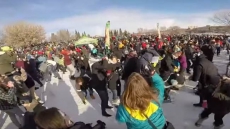OTTAWA — Some 20 years ago, University of Saskatchewan political scientist John Courtney wrote that it's "inherently destabilizing" for a political party to conduct periodic leadership reviews.
Tom Mulcair, who faces a leadership review vote this weekend, would no doubt agree with Courtney that such a process "invites dissension."
Technically, delegates to this weekend's convention will be asked in a secret ballot to decide whether the party should hold a leadership convention. It amounts to a vote of confidence in Mulcair's leadership after he led the party to a disappointing third-place finish in last fall's federal election.
The NDP conducts such votes at every convention, though they rarely generate the kind of tension attending this one.
Both the Liberals and Conservatives put their leaders to similar tests — but only at the first national convention following an election in which the leader does not become prime minister. Some provincial parties also subject their leaders to leadership reviews.
Herewith, with the help of Courtney, a brief history of leadership reviews and some of the most dramatic moments they've produced:
— The Liberal Party of Canada was the first to adopt a leadership review process, in 1966, with the implicit understanding that it would not be used until after then-leader Lester Pearson stepped down. That process was first employed in 1970, when Pierre Trudeau's leadership was handily endorsed.

— Also in 1966, the Progressive Conservatives were waging a bitter internal war over John Diefenbaker's leadership. Dalton Camp ran for party president on the promise that he'd hold a leadership convention within a year. He won, the leadership convention was held in 1967 (electing Robert Stanfield). Leadership reviews were entrenched in the party's constitution in 1969.
— 1983, Progressive Conservative leader Joe Clark's leadership is endorsed by 66.9 per cent of delegates, with 33.1 per cent voting for a leadership convention. Clark decides that's insufficient to silence his critics within the party and resigns. He runs in the subsequent leadership race but loses to Brian Mulroney.
— 1986, Liberal leader John Turner faces a vigorous effort to dump him, led in part by supporters of Jean Chretien, runner-up to Turner in the party's 1984 leadership race. An organized campaign, dubbed the Friends of John Turner, spends almost a full year and pulls out all the stops to win the leadership review. Turner is endorsed by 76 per cent of delegates, remaining leader until 1990.
— August 2002, Liberal leader and prime minister Chretien announces his intention to retire in 18 months, heading off a potentially humiliating result in a leadership review scheduled for February 2003. The party, controlled by erstwhile leadership rival Paul Martin at the time, eventually pressures him to move up his retirement date to November 2003.
— 2005, Parti Quebecois leader Bernard Landry quits in a huff during a party convention after winning a 76-per-cent endorsement, which he deems insufficient.
— 2006, Alberta premier and Conservative leader Ralph Klein is endorsed by just 55 per cent of delegates, even though he'd previously announced his intention to retire in 2008. He resigns a few months later.




